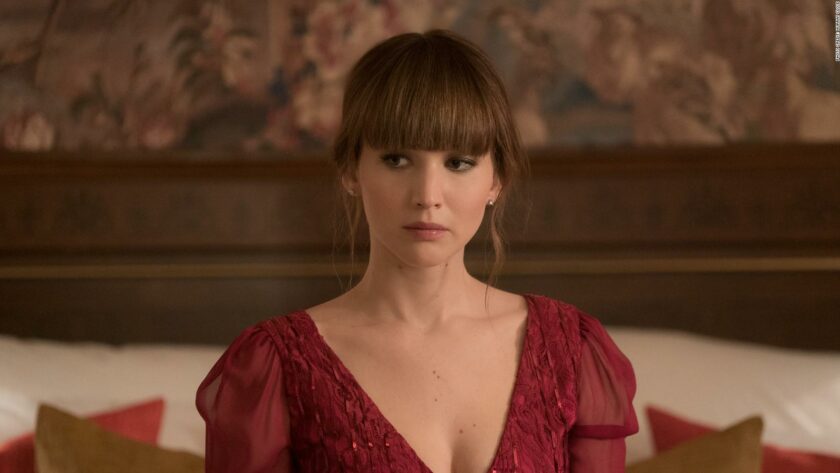Hebe Hamilton reviews Jennifer Lawrence’s latest spy thriller.
CW: Rape, sexual assault/harassment.
Is it ironic I went to see Red Sparrow, a film that sees its female protagonist sent off to “whore school”, on International Women’s Day? Probably. Is it even odder that 20th Century Fox would choose to release a film like Red Sparrow against the backdrop of the Time’s Up and #MeToo campaigns? It’s certainly questionable.
I entered the screening unsure what to expect, beyond gruesome scenes of torture (as per the trailer), and hints of sexual exploitation on Lawrence’s character’s part, which is certainly an uncomfortable prelude to have in mind before any film. In Red Sparrow, Jennifer Lawrence plays Dominika Egorova, a Bolshoi prima ballerina whose career is cut short when her clumsy dance partner ends up breaking her leg mid-performance. To avoid losing the accommodation she shares with her sick mother, Dominika takes up an offer from her wealthy uncle (Matthias Schoenaerts) to begin working for the Russian Intelligence as a ‘sparrow’, capable of seducing her targets by giving them “what they need most”. Played out against Dominika’s story is that of Nate Nash (Joel Edgerton), an American CIA operative who uses a Russian mole to infiltrate the operations of the Russian authorities. Naturally, the two end up crossing paths in Budapest after Dominika is removed from training early in order to seduce Nash and learn the identity of the Russian mole. However, Dominika turns tail and decides to co-operate with Nash and the CIA as a double agent, as revenge against her uncle’s manipulative tactics and his attempts to sell her body.

Perhaps it’s already obvious, but viewers should be warned this is anything but a feminist film. Though Lawrence’s protagonist achieves victory against her uncle in the end, the sexual violence her protagonist has to endure to get there is degrading and, in all honesty, completely irrelevant to the overall plot. The only reason one can imagine an actress as high-profile as Lawrence would take such a role is to attempt to push the boundaries of how she is perceived for future roles. That, or she and the director, Francis Lawrence, are making an attempt to shock the audience in order to highlight the personal strength of Dominika, due to the character’s determined nature, but the effect is rather the opposite.
For the first half of the film, if not longer, Dominika is shown to be nothing more than an object for the sexual gratification of powerful men, and a pawn for her sadistic uncle’s ulterior motives. She is subject to two experiences of violent sexual assault, including one rape scene; she is ordered to strip naked at least twice with dubious consent, including in front of her fellow ‘sparrows’; and she is tortured and bound, at times semi-clothed, while being beaten on command by male guards. Her eventual relationship with Nash, if we can even call it that, is a breath of relief in comparison to these earlier scenes, ranging from sexual harassment and objectification to assault. Add in Charlotte Rampling’s matron and her sermon about the agents’ bodies “belong[ing] to the State”, and we’re given a sexist narrative which eliminates the meaning of consent, undermines young women, and sweepingly boxes the men into two categories: the abusers, and those who are targets for sexual exploitation.

Whether this form of espionage, dubbed “sexpionage”, ever did exist either in Russia or elsewhere in the world, the fact remains that the execution of the narrative by the director, and screenwriter Justin Haythe, is short-sighted and beleaguered by outdated views on women; their role in spy networks and the working world as a whole; and a stereotypical Cold War view of Russia when the Cold War ended nearly 30 years ago. I won’t attempt to comment on the political situation today, but the fact that the matron in Red Sparrow even mentions the Cold War and that it “shattered into a thousand sharp pieces”, rather than ended for good (apparently), reminds us that we are dealing with a superficial, highly stigmatised Hollywood view of Russia and its people. The fact none of the leading cast members are Russian speaks volumes about the dubious cultural viewpoints and portrayals in the film. An interesting thing to consider is if this had been a Russian language film with a Russian cast, instead of a Hollywood blockbuster: would the film have received the same level of controversy then?
This brings me onto my next point: accents. The film boasts a number of famous names, from Jeremy Irons to Ciaran Hinds, but the ability to master the Russian accent varies between cast members. Irons, as always, manages to convey the accent so subtly and accurately that he sounds almost like a native speaker. Jennifer Lawrence’s accent is overdone and stereotyped: she would probably get away with this in a stage environment, but it doesn’t really work onscreen. I will add that she certainly gives a very confident and polished leading performance apart from this. Hinds is not onscreen as much as his co-stars, and always has presence when we do see him, but his accent is another which sounds overly throaty when it needn’t be.

If the earlier scenes of sexual violence were removed from the film, it would actually make quite an interesting story, especially regarding Dominika’s relationship with the American Intelligence teams and the role of double agents in international espionage. The film weaves between at least four different cities, including Budapest and London, with excellent cinematography and aerial shots of both, and this provides a suitable contrast to the extreme brutalist architecture and landscape in some of the scenes in Russia. There is also enough suspense in the narrative that the audience are constantly left questioning who Dominika really supports, until she intervenes in a gory confrontation between Nash and Russian assassin, Simyonov (Sergej Onopko). Finally, the writers leave the revelation of the mole’s identity carefully concealed until the denouement, but when we learn who it is it makes a satisfying resolution, and allows Dominika to eventually achieve freedom from her uncle’s control.
Wherever Jennifer Lawrence chooses to take her career after Red Sparrow, she would be best advised to think carefully in the future about pursuing roles which could overshadow her performances with sexist plot lines and the degradation of her female protagonists.
Red Sparrow is out now in UK cinemas. Check out the trailer below:




